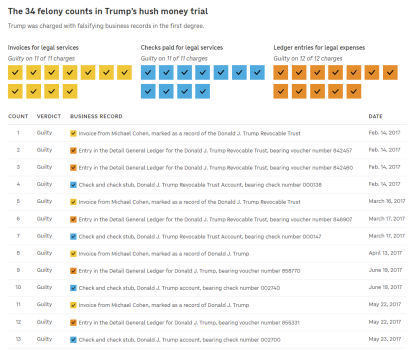I am not a Trump hating liberal. I have been a Republican all my life. But I am also a lawyer, dedicated to the justice system -- and when someone claims that a trial was "rigged" or "fixed" I want to see the evidence. If these 12 jurors were manipulated or bribed or otherwise cajoled into finding Trump guilty, show me the evidence and I'll believe it. Not speculation. EVIDENCE.
The link is a copy of the full jury instructions ... all %% pages of them
First... they were NOT permitted to take them back to the deliberation room. If and when they had any questions they had to have the judge read them.
Next... it took the judge 1 1/2 hours to read them.
Your verdict, on each count you consider, whether guilty or not guilty, must be unanimous. In order to find the defendant guilty, however, you need not be unanimous on whether the defendant committed the crime personally, or by acting in concert with another, or both.
Although you must conclude unanimously that the defendant conspired to promote or prevent the election of any person to a public office by unlawful means, you need not be unanimous as to what those unlawful means were. In determining whether the defendant conspired to promote or prevent the election of any person to a public office by unlawful means, you may consider the following: (1) violations of the Federal Election Campaign Act otherwise known as FECA; (2) the falsification of other business records; or (3) violation of tax laws.
____________________________________
From Politifact:
Juror unanimity is not necessary on what separate crime Trump intended to commit. Merchan cited three possible crimes: violations of the Federal Election Campaign Act; the falsification of other business records; and a violation of tax laws.
Jurors "all need to agree on the verdict, but they can get to that result through different paths and reasoning," said Cheryl G. Bader, a Fordham University associate clinical law professor.
Merchan’s instructions were clear: a guilty or not guilty verdict must be unanimous
In his
instructions, Merchan told jurors that any verdict must be unanimous.
"Your verdict, on each count you consider, whether guilty or not guilty, must be unanimous; that is, each and every juror must agree to it," Merchan said. "To reach a unanimous verdict, you must deliberate with the other jurors."
That’s standard in criminal law: The
New York jury handbook says that in a criminal case, "a finding that the defendant is guilty or not guilty must be by unanimous vote of the jury."
But Merchan offered caveats about what aspects of a jury’s decision could diverge.
Merchan said, "In order to find the defendant guilty, however, you need not be unanimous on whether the defendant committed the crime personally, or by acting in concert with another, or both."
He also said, "Although you must conclude unanimously that the defendant conspired to promote or prevent the election of any person to a public office by unlawful means,
you need not be unanimous as to what those unlawful means were."




